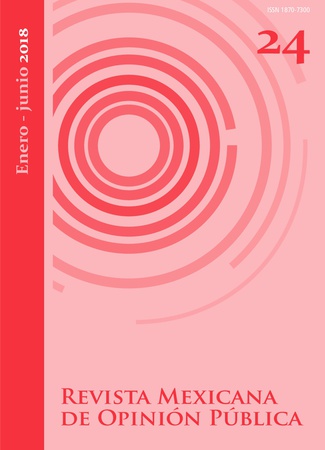Media, Knowledge and Understanding of Public Opinion on Political Affairs. The Mexican Case
Main Article Content
Abstract
What relevance do the media have in strengthening the knowledge and understanding of political issues in public opinion? This paper is one of the first studies to examine the determinants of both knowledge and understanding in political affairs, for the Mexican case. The research uses a survey conducted in Mexico by the Latin American Public Opinion Project (lapop) in 2014, through the management of Ordinary Least Squares (ols) models. Based on McCombs’s classic proposal on the “need for information-orientation” of public opinion, this work shows as a main finding that the media strengthen both knowledge and understanding of public opinion about political events, which It indicates that the media not only inform but “form” opinion among the citizens.
Article Details
Citas en Dimensions Service
References
ACOCK, Alan C., A Gentle Introduction to Stata, Stata Press, Texas, 2008.
AMADO, Adriana, Omar Rincón et al., La palabra empeñada. Investigaciones sobre medios y comunicación pública en Argentina, Centro de Competencia en Comunicación para América Latina, Buenos Aires, 2010.
BLUMER, Herbert, Collective Behavior, Barnes and Noble, Nueva York, 1951.
BOURDIEU, Pierre, “Public Opinion Does Not Exist”, en Armand Mattelart y Seth Siegelaub (eds.), Communication and Class Struggle, Longman, Nueva York, 1991, pp. 124-130.
CAÑIZÁLEZ, Andrés, “El presidente es el mensaje. Populismo y personalismo en la comunicación gubernamental de Venezuela”, en Matías Ponce y Omar Rincón (coords.), Caudillismo e-política y teledemocracia, Fin de Siglo, Montevideo, 2013, pp. 231-255.
DELLI CARPINI, Michael y Scott Keeter, What Americans Know About Politics and Why It Matters, Yale University Press, New Haven, 1996.
DENNY, Kevin y Orla Doyle, “Political Interest, Cognitive Abiltiy and Personality. Determinants of Voter Turnout in Britain”, British Journal of Political Science, vol. 38, núm. 2, Cambridge University Press, Cambridge, 2008, pp. 291-310.
DOWNS, Anthony, An Economic Theory of Democracy, Harper Collins, Nueva York, 1957.
FERBANCH, Philip et al., “Political Extremism Is Supported by an Illusion of Understanding”, Psychological Science, vol. 24, núm. 6, SAGE Publication, Association for Psychological Science, Los Ángeles, 2013, pp. 1-8
GLYNN, Carroll J. et al., Public Opinion, Westview Press, Colorado, 2004.
GUO, Zhongshi y Patricia Moy, “Medium or Message? Predicting Dimensions of Political Sophistication”, International Journal of Public Opinion Research, vol. 10, núm. 1, Oxford University Press, Oxford, 1998, pp. 25-50.
HALLIN, Daniel C. y Paolo Mancini, Comparing Media Systems, Cambridge University Press, Nueva York, 2004.
HERBST, Susan, Reading Public Opinion. How Political Actors View the Democratic Process, Chicago Press, Chicago, 1998.
HUGHES, Sallie, Newsrooms in Conflict. Journalism and the Democratization of Mexico, University of Pittsburgh Press, Pittsburgh, 2006.
IYENGAR, Shanto y Donald Kinder, News that Matters. Television and American Opinion, Chicago Press, Chicago, 1987.
Latin American Public Project (LAPOP), Vanderbilt University, Nashville, 2014 [en línea]. Base de datos disponible en < edu/lapop/raw-data.php> [fecha de consulta: mayo a julio, 2017].
LAWSON, Chappell, Building the Fourth Estate. Democratization and the Rise of a Free Press in Mexico, University of California Press, Berkeley, 2002.
LE BON, Gustave, The Crowd. A Study of the Popular Mind, Viking Press, Nueva York, 1948.
LIPPMANN, Walter, The Phanton Public, Harcourt, Brace and Company, Nueva York, 1925.
MCCOMBS, Maxwell y Donald Shaw, “The Agenda-Setting Function of Mass Media”, The Public Opinion Quarterly, vol. 32, núm. 2, 1972, pp. 176-187.
MCCOMBS, Maxwell, Setting the Agenda, Polity Press, Cambridge, 2014.
MILLER, Joanne M. y Jon A. Krosnick, “News Media Impact on the Ingredients of Presidential Evaluation”, American Journal of Political Science, vol. 44, núm. 2, 2000, pp. 301-315.
NEUMAN, Russell, The Paradox of Mass Politics. Knowledge and Opinion in the American Electorate, Cambridge University Press, Cambridge, 1986.
NOELLE-NEUMANN, Elisabeth, The Spiral of Silence. Public Opinion, Our Social Skin, University of Chicago Press, Chicago, 1984.
PONCE, Matías, Caudillismo, e-política y teledemocracia, Fin de Siglo, Montevideo, 2013, pp. 97-117.
POPKIN, Samuel, The Reasoning Voter, Chicago Press, Chicago, 1994.
SHAW, Donald y Maxwell McCombs (eds.), The Emergence of American Political Issues, West Publications, Saint Paul, Minnesota, 1977.
STOCK, James H. y Mark W. Watson, Introduction to Econometrics, Pearson, Boston, 2007.
TREJO DELARBRE, Raúl, Mediocracia sin mediaciones. Prensa, televisión y elecciones, Cal y Arena, México, 2001.
VERBA, Sydney et al., “Knowing and Caring About Politics. Gender and Political Engagement”, The Journal of Politics, vol. 59, núm. 4, University of Chicago Press, Chicago, 1997, pp. 1051-1072.
WEAVER, David, Doris Graber, Maxwell McCombs y Chain Eyal, Media Agenda Setting in Presidential Elections. Issues, Images and Interests, Greenwood Press, Westport, Connecticut. 1981.
WOOLDRIDGE, Jeffrey, Introductory Econometrics, Thomson South-Western, Ohio, 2003.

Revista Mexicana de Opinión Pública por Universidad Nacional Autónoma de México se distribuye bajo una Licencia Creative Commons Atribución-NoComercial-SinDerivar 4.0 Internacional.
Basada en una obra en http://revistas.unam.mx/index.php/rmop.




